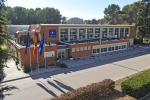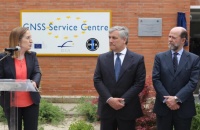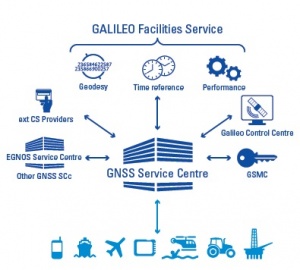If you wish to contribute or participate in the discussions about articles you are invited to contact the Editor
GNSS Service Centre: Difference between revisions
m (moved Galileo Service Centers to GNSS Service Center) |
No edit summary |
||
| Line 1: | Line 1: | ||
{{Article Infobox2 | {{Article Infobox2 | ||
|Category=GALILEO | |Category=GALILEO | ||
|Authors=GSA | |||
|Editors=GMV | |Editors=GMV | ||
|Level=Basic | |Level=Basic | ||
|YearOfPublication=2013 | |YearOfPublication=2013 | ||
}} | }} | ||
The [http://www.gsc-europa.eu/ European GNSS Service Centre (GSC)] is an integral part of the European GNSS infrastructure providing the single interface between the Galileo system and the users of the [[Galileo Open Service (OS)]], and the [[Galileo Commercial Service (CS)]]. | |||
==The European GNSS Service Centre== | |||
[[File: GSCfacilities.jpg|left|thumb|150px]] | |||
The [http://www.gsc-europa.eu/ European GNSS Service Centre (GSC)] is an integral part of the European GNSS infrastructure providing the single interface between the Galileo system and the users of the [[Galileo Open Service (OS)]], and the [[Galileo Commercial Service (CS)]]. | |||
The [http://www.gsc-europa.eu/ GNSS Service Centre (GSC)] is | |||
The [http://www.gsa.europa.eu/ European GNSS Agency (GSA)] is responsible for the management of the GSC. | |||
The Centre is located in Madrid, within the National Institute of Aerospace Technology (INTA) facilities in Torrejón de Ardoz. | |||
==History== | |||
[[File: GSCinaug.jpg|right|thumb|200px]] | |||
The European GNSS Service Centre was inaugurated in May 2013 by the Vice-President of the European Commission, Antonio Tajani, Commissioner for Industry and Entrepreneurship and the Spanish Minister of Transport, Ana Pastor. The Centre was named as a tribute to the previous Vice President `Loyola de Palacio´ of the European Commission and Commissioner for Transport<ref>http://ec.europa.eu/enterprise/newsroom/cf/itemdetail.cfm?item_id=6628&lang=en </ref>. | |||
On the 17th of March 2011, a Memorandum of Understanding (MoU) between the EC and the Government of Spain was signed by the Vice-President of the European Commission and Commissioner for Industry and Entrepreneurship, Antonio Tajani and the Spanish Minister of Transport José Blanco López. | |||
The MoU establishes the conditions and requirements for hosting the GNSS Service Center (GSC) in Spain and for a Spanish study of the centre definition. | |||
The agreement for the deployment of the Centre was published on the Official Journal of the European Union of 23rd of February 2012 in which it was stated that the global network of ground-based stations as part of the Galileo programme includes six centres and one station. The GSC is one of these six ground-based stations (MCC, GSMC, GSC, GRC). | |||
==Mission== | |||
[[File: GSCobj.jpg|right|thumb|300px]] | |||
The objectives of the Centre are to: | |||
#Provide companies and users with general information: provide basic services to the user community via a web portal and a user helpdesk. | #Provide companies and users with general information: provide basic services to the user community via a web portal and a user helpdesk. A dedicated website www.gsc-europa.eu is available to help Galileo users to answer their needs. | ||
#Distribute timely service notices: information on the system, system status and user notifications. | #Distribute timely service notices: information on the system, system status and user notifications. | ||
#Support service provision: sharing of R&D and industry knowledge by market | #Support service provision: sharing of R&D and industry knowledge by market segments. | ||
#Provide up-to-date information on | #Provide up-to-date information and performance reporting on Programme status | ||
#Provide support to application and product developers including access to market experts in key segments. | #Provide support to application and product developers including access to market experts in key segments. | ||
==Future and Evolution== | |||
During the Galileo In-Orbit Validation (IOV) phase, the GSC is operating a general Helpdesk function. An upgrade will be developed to support Early Services provision as of end of 2014 with additional content and functionalities. | |||
A new version of the GSC will be developed to support the commercial data dissemination through a real-time interface by 2015. The GSC will continue to evolve over time in order to become fully functional in support of Galileo Full Operational Capability (FOC) services. | |||
<b>First Stage: GSC Nucleus and OS helpdesk during the IOV phase</b> | |||
The GSC Nucleus provides a general Helpdesk function<ref>http://www.gsa.europa.eu/news/european-gnss-service-centre-open-help-users</ref>. | |||
The main services are: | |||
*Provision of basic services to the user community via a web portal and a user helpdesk. | |||
*Information on system, system status and user notifications. | |||
*Sharing of R&D and industry knowledge by market segments. | |||
*Information on programme status and ICD documents. | |||
*Access to market experts in key segments. | |||
<b>Mid Stage: GSC upgrade and OS helpdesk for Galileo Early Services </b> | |||
The GSC Services will be upgraded for Galileo Early Services by the end of 2014 with additional and web functionality. | |||
<b>Last Stage: GNSS Service Centre (OS and CS) at FOC</b> | |||
The GSC will act as the single interface between the Galileo System and the Open Service (OS) users, and the Commercial Service (CS) providers and / or users. | |||
It will also provide CS service performance assessment and notice to users. The GSC will host a centre of expertise for OS, CS service aspects accessible to the user via the user helpdesk and the web portal. | |||
The information will be provided through the dissemination Platform for Galileo related products, electronic library with Galileo and GNSS reference documentation and on demand retrieval and delivery of specific Galileo data. | |||
The GSC will support the Open and Commercial services and their applications. | |||
==Related Links== | |||
For further information please refer to the following links: | |||
* http://www.gsc-europa.eu/ | |||
* http://www.egnos-portal.eu/news/european-gnss-service-centre-helps-users-access-data | |||
Revision as of 08:10, 6 June 2013
| GALILEO | |
|---|---|
| Title | GNSS Service Centre |
| Author(s) | GSA |
| Edited by | GMV |
| Level | Basic |
| Year of Publication | 2013 |
The European GNSS Service Centre (GSC) is an integral part of the European GNSS infrastructure providing the single interface between the Galileo system and the users of the Galileo Open Service (OS), and the Galileo Commercial Service (CS).
The European GNSS Service Centre
The European GNSS Service Centre (GSC) is an integral part of the European GNSS infrastructure providing the single interface between the Galileo system and the users of the Galileo Open Service (OS), and the Galileo Commercial Service (CS).
The European GNSS Agency (GSA) is responsible for the management of the GSC.
The Centre is located in Madrid, within the National Institute of Aerospace Technology (INTA) facilities in Torrejón de Ardoz.
History
The European GNSS Service Centre was inaugurated in May 2013 by the Vice-President of the European Commission, Antonio Tajani, Commissioner for Industry and Entrepreneurship and the Spanish Minister of Transport, Ana Pastor. The Centre was named as a tribute to the previous Vice President `Loyola de Palacio´ of the European Commission and Commissioner for Transport[1].
On the 17th of March 2011, a Memorandum of Understanding (MoU) between the EC and the Government of Spain was signed by the Vice-President of the European Commission and Commissioner for Industry and Entrepreneurship, Antonio Tajani and the Spanish Minister of Transport José Blanco López. The MoU establishes the conditions and requirements for hosting the GNSS Service Center (GSC) in Spain and for a Spanish study of the centre definition.
The agreement for the deployment of the Centre was published on the Official Journal of the European Union of 23rd of February 2012 in which it was stated that the global network of ground-based stations as part of the Galileo programme includes six centres and one station. The GSC is one of these six ground-based stations (MCC, GSMC, GSC, GRC).
Mission
The objectives of the Centre are to:
- Provide companies and users with general information: provide basic services to the user community via a web portal and a user helpdesk. A dedicated website www.gsc-europa.eu is available to help Galileo users to answer their needs.
- Distribute timely service notices: information on the system, system status and user notifications.
- Support service provision: sharing of R&D and industry knowledge by market segments.
- Provide up-to-date information and performance reporting on Programme status
- Provide support to application and product developers including access to market experts in key segments.
Future and Evolution
During the Galileo In-Orbit Validation (IOV) phase, the GSC is operating a general Helpdesk function. An upgrade will be developed to support Early Services provision as of end of 2014 with additional content and functionalities.
A new version of the GSC will be developed to support the commercial data dissemination through a real-time interface by 2015. The GSC will continue to evolve over time in order to become fully functional in support of Galileo Full Operational Capability (FOC) services.
First Stage: GSC Nucleus and OS helpdesk during the IOV phase
The GSC Nucleus provides a general Helpdesk function[2].
The main services are:
- Provision of basic services to the user community via a web portal and a user helpdesk.
- Information on system, system status and user notifications.
- Sharing of R&D and industry knowledge by market segments.
- Information on programme status and ICD documents.
- Access to market experts in key segments.
Mid Stage: GSC upgrade and OS helpdesk for Galileo Early Services
The GSC Services will be upgraded for Galileo Early Services by the end of 2014 with additional and web functionality.
Last Stage: GNSS Service Centre (OS and CS) at FOC
The GSC will act as the single interface between the Galileo System and the Open Service (OS) users, and the Commercial Service (CS) providers and / or users.
It will also provide CS service performance assessment and notice to users. The GSC will host a centre of expertise for OS, CS service aspects accessible to the user via the user helpdesk and the web portal.
The information will be provided through the dissemination Platform for Galileo related products, electronic library with Galileo and GNSS reference documentation and on demand retrieval and delivery of specific Galileo data.
The GSC will support the Open and Commercial services and their applications.
Related Links
For further information please refer to the following links:
- http://www.gsc-europa.eu/
- http://www.egnos-portal.eu/news/european-gnss-service-centre-helps-users-access-data



